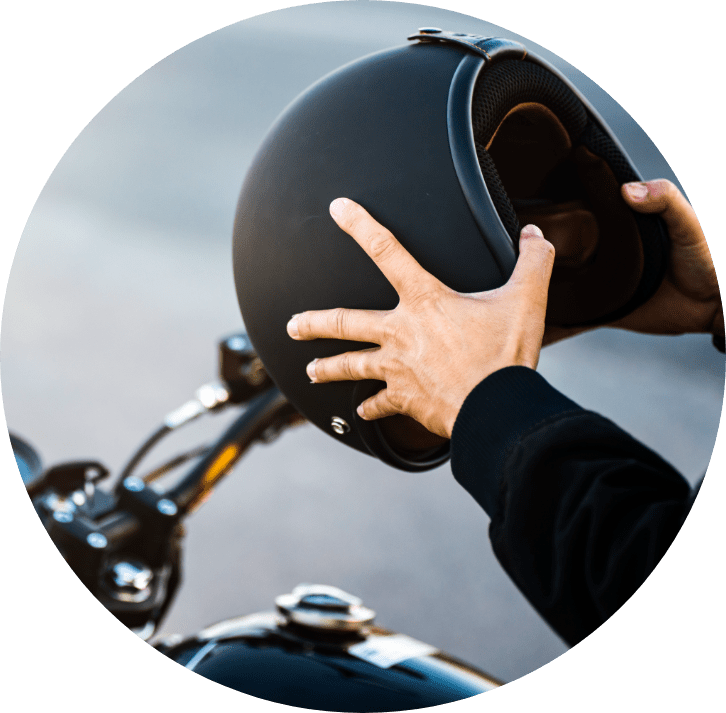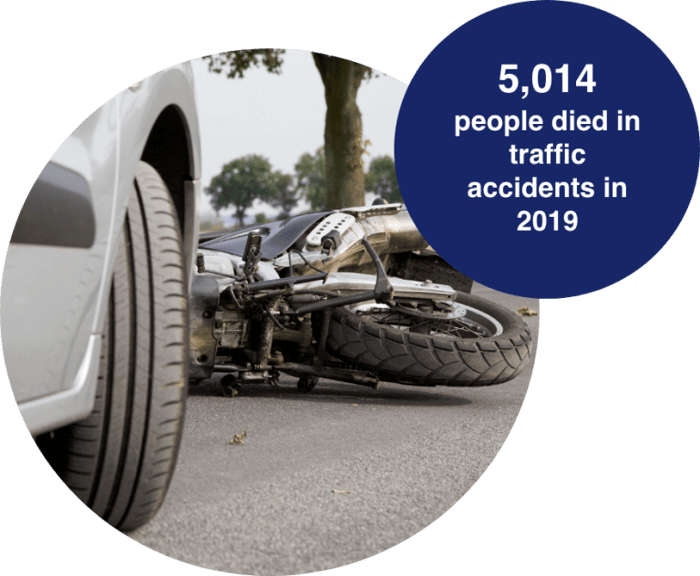Were you hurt or was a loved one killed in a motorcycle wreck in Georgia?
Finding an experienced lawyer with the right background is crucial. Our attorneys specialize in securing compensation for injured motorcycle crash victims and their families.
Why do you ride? Perhaps you enjoy the freedom, culture, camaraderie, fun and feeling you get cruising down the road on your motorcycle; or maybe you ride for more practical reasons such as lower fuel costs, better maneuverability and easier parking (which can be a particular challenge in downtown Atlanta). Whatever your reason for riding, operating a motorcycle has its dangers and risks, namely safety in the event of an accident.
Out of 100 vehicles on the road, only 3 of them will be motorcycles according to the National Highway Traffic Safety Administration (NHTSA). And yet, motorcyclists account for up to 14 percent of all traffic deaths. In fact, motorcycle operators and their passengers are about 29 times more likely than other motorists to be killed in a fatal crash, and 4 times more likely to be seriously injured. In 2019, 5,014 motorcyclists died in traffic accidents in the U.S.
The statistics are just as grim when you look closer to home, which will come as no surprise if you live and drive in Georgia. Georgia ranks 18th in the nation for the highest rate of motorcycle deaths, and it’s common to hear news of serious and fatal motorcycle wrecks on busy highways and interstates like I-20, I-75, I-85, Lee St., MLK Jr. Drive, Old National Highway, Metropolitan Pkwy and I-285.
If you or a loved one were seriously injured in a motorcycle wreck—or your loved one was killed in a fatal crash—you should know that Georgia personal injury laws allow some folks to recover compensation from the at-fault driver for damages like medical bills, lost wages, pain and suffering, burial expenses and more.
Unfortunately, injured motorcyclists face a number of unique challenges and obstacles to obtaining the benefits owed to them—such as negative social stigma and bias against motorcyclists. For this reason, you should consult with an experienced Georgia motorcycle accident lawyer about your rights.
Common causes of motorcycle accidents
Driver negligence
The number 1 cause of motorcycle accidents is careless drivers who don't see a motorcyclist and pull out in front of one or sideswipe them while switching lanes. This real and present danger is why many motorcyclists try to make themselves as conspicuous as possible with loud engines, colorful clothing and other signals. Whether caused by a blind spot, mirror glare or simply inattentiveness, motorcyclists are ultimately the ones who pay the price for another motorist's negligence.
Drunk/drugged driving
Nearly a third (29 percent) of motorcyclists killed in 2019 were reported to be drunk at the time of the fatal crash. What's more, other motorists may be driving while impaired and strike a motorcyclist. You can't control someone else's behavior, but you can be sure to only operate a motorcycle when you are sober and able to be on the lookout for reckless driving from a drunk driver or someone under the influence of drugs.
Distracted driving
Texting and driving is a major problem in Georgia, so much so that the state enacted a strict cellphone ban (called the Hands-Free Georgia Act) in 2018 to prevent drivers from holding a cell phone or similar technology in their hands or letting it touch any part of their body while they drive. This is good news for Atlanta motorcyclists, who are at increased danger from distracted drivers, but distracted driving continues to pose a threat to motorcyclists everywhere.
Bad weather
Rain can make the roads slick and limit visibility which can be a danger for all drivers especially motorcyclists. In the Atlanta area, other hazardous weather events can include hail, high winds, tornados, thunderstorms, flooding and even the occasional ice or snow storm. While you can't control the weather and the hazardous road conditions they create, you can control your actions by checking the forecast before you hop on your bike and slowing down or pulling over if necessary to wait out inclement weather.
Road hazard
When on 2 wheels, poor road conditions and obstacles like potholes, pavement defects, construction areas, road debris, loose gravel and other hazards on the road can throw a motorcyclist off-balance or cause them to lose control.
Speeding
Whether the person speeding is a motorcyclist or another driver, traveling at higher speeds increases the distance required to stop to avoid a collision. Speeding also makes impacts more forceful and crashes more severe.
Sudden stops
If stopped traffic or a road hazard forces a motorcyclist to make an abrupt stop, a rear-end collision can occur. Rear-end accidents, which can be caused when a vehicle follows a motorcycle too closely (or vice versa), are particularly dangerous and deadly for motorcyclists.
Lane splitting
When a motorcyclist drives between 2 lanes of traffic, this is known as “lane splitting” or “lane filtering.” While legal in certain states, the practice is prohibited in Atlanta and throughout Georgia. Unsafe lane changes increase the risk of a motorcycle-vehicle collision.
Motorcycle defects
If a defective or poorly designed motorcycle component is responsible for a motorcycle crash, then the manufacturer, seller or distributor of the defective part may be liable for injuries and damages. Some of the most common defective motorcycle parts involve brakes, tires, fuel systems, handlebars and engines.
Motorcycle crash injuries are often serious
Road rash can be a severe injury that primarily affects motorcyclists who are thrown from their bikes and slide across the road pavement. The force of the friction between the pavement and the motorcyclist’s skin produces extreme heat that scrapes, bruises and burns human flesh. The severity of the road rash depends on how far the motorcyclist slides, as well as what protective clothing and equipment they are wearing. Serious infections and permanent scarring are common in serious road rash injuries.
Other commonly reported motorcycle injuries after a crash or collision include:
- ● Traumatic brain injury (TBI)
- ● Spinal cord injury and paralysis
- ● Internal bleeding and organ damage
- ● Broken bones
- ● Back and neck injuries (whiplash)
- ● Severe burns
- ● Amputation and disfigurement
- ● Bruises
- ● Lower extremity injury (legs, calves,
ankles, feet, knees)
Georgia motorcycle accident laws
Georgia’s motorcycle laws can primarily be found in Title 40, Chapter 6 (§ 40-6-310 through § 40-6-315). These statutes cover everything from right of way and lane splitting laws, to equipment and helmet requirements.
Georgia motorcycle helmet laws, for example, are specifically covered in § 40-6-315 (Headgear and eye-protective devices for riders) which states:
“No person shall operate or ride upon a motorcycle unless he or she is wearing protective headgear which complies with standards established by the commissioner of public safety.”
In Georgia, the Commissioner of Public Safety has provided a written ruling to the Georgia Secretary of State saying that all helmets must meet the latest DOT (Department of Transportation) standards for motorcycle helmets in order to qualify as approved protective headgear.
Generally speaking, you can look for the DOT certified sticker on the back of the helmet. (Visit the NHTSA website for tips on choosing the right motorcycle helmet.)
In addition to helmet requirements, Georgia’s code prescribes the following rules for motorcyclists:
● Motorcyclists have all the same rights and responsibilities to follow traffic laws as every other driver.
● Passengers may only ride on a motorcycle if there is a permanent and regular seat designed to carry a passenger. This passenger seat must be equipped with footrests, unless it is a sidecar or enclosed cab.
● Motorcyclists must sit astride the seat with one leg on either side of the bike, facing forward, at all times while operating the motorcycle.
● Motorcyclists must have both hands on the handlebars at all times. Any action that prevents this—such as carrying a package—is prohibited.
● Motorcyclists must wear footwear (they cannot go barefoot or wear socks without shoes).
● Motorcycles can drive 2 abreast in a single lane, but no more.
● Motorcyclists cannot overtake and pass a vehicle in the same lane.
● Lane splitting (going between lanes of traffic or between adjacent lines or rows of vehicles) is against the law.
● Motorcycle handlebars must be 15 inches or less in height above the driver seat.
● All motorcycles must be equipped with a windshield, unless the operator is wearing a DOT-approved eye protection device.

In regard to filing a personal injury lawsuit for an accident involving a motorcycle, the same laws apply whether the parties involved were driving a car, SUV, van, truck, motorcycle, scooter, moped, bicycle or another motor vehicle.
Here are 3 of the most important legal concepts to understand:

Modified comparative negligence
As long as you weren’t primarily at fault for the motorcycle accident, you can recover damages. However, since Georgia follows a modified comparative fault system, your compensation can be reduced if you were partly responsible for the crash.

Establishing negligence
Because of Georgia’s modified negligence law, proving fault (liability) is especially important. In order to successfully establish negligence in a motorcycle accident lawsuit, you must present compelling evidence to prove that the other driver or party (defendant) failed to uphold their duty to drive safely and that this failure directly caused you injury, damage and losses.

Statute of limitations
You can file a motorcycle accident lawsuit up to 2 years after the collision or crash, under Georgia law. There are only a few exceptions to this deadline. The sooner you seek professional legal help though, the more time your legal team has to prepare a strong case against the at-fault party.

Overcoming bias against motorcyclists
If you are a motorcyclist, then it’s probably not news to you that certain stereotypes and stigma exist about motorcycles and the people who ride them—for example, that all motorcyclists are reckless thrill-seekers with little regard for traffic rules, speed limits and personal safety. Sure, there are some motorcyclists out there with these qualities—just as there are reckless and dangerous car drivers—but this doesn’t mean that all people who operate a motorcycle are reckless.
While we know better, unfortunately this unfair and untrue negative bias can come into play in a personal injury case involving a motorcyclist who is seeking compensation from another driver who hit them or a motorcycle part manufacturer as judges and juries consider how much compensation is owed.
Studies have shown that motorcyclist plaintiffs are less likely to win awards and be offered lower settlements compared to other motorists.
One way to combat this unfair stigma is to always follow Georgia’s motorcycle laws, particularly helmet laws. If a judge and jury can see that you were wearing a DOT-approved helmet and following the traffic rules at the time of the crash, you may be able to make a stronger case for compensation.
Above all, the best way to combat negative bias and protect your right to compensation is to seek representation from a qualified law firm who has experience and a record of success in motorcycle accident cases and who knows how to overcome stigma against motorcyclists.
What to do after a motorcycle accident
The seconds and minutes after a motorcycle wreck can be chaotic and blurred. Time might seem to slow down or stand still due to your shock and adrenaline. But in reality, time is of the essence in these scenarios, and what actions you take (or don’t take) can have long-term repercussions.
Here’s are few important steps to follow after a motorcycle accident in Atlanta:
1. Seek medical attention
Motorcyclists rarely walk away from an accident. First and foremost, you should seek emergency medical care for your injuries by calling an ambulance or seeing a doctor immediately. This is important even if you don't feel seriously hurt since some physical injuries (like internal bleeding, or soft tissue injuries, and whiplash) don't appear until later, after the adrenaline has worn off. The sooner you get medical treatment, the better for your health and potential future injury claim.
3. Notify your insurer
It's important to notify your auto insurance company that you were in a motorcycle accident as soon as possible. Many insurers require their customers to inform them of an accident and file any personal injury claims within a certain amount of days. If you miss this deadline, they may use this delay as an excuse to deny your motorcycle accident claim and not pay for things like medical expenses. However, you should NOT speak with the other driver's insurance company or partake in any settlement negotiations until you've spoken with an auto accident lawyer first. A quick settlement only helps the liable party, not the injured person.
2. Gather evidence
If you are one of the fortunate few who didn't suffer a life-threatening injury following a motorcycle crash and feel okay, use the time you have at the accident scene wisely by collecting important evidence that will help determine fault for a fair settlement. For example, as you wait for law enforcement to arrive and fill out a police report, take pictures and video of the accident scene, as well as record the other driver's license plate number, insurance company and policy number, and the make and model of the car that hit you. You should also get the names and contact information of any eyewitnesses. Avoid talking to the other driver during this time and never admit fault.
4. Consult an attorney
Meet with a personal injury lawyer near you who specializes in motorcycle accident cases to learn about your rights, start preparing your case before the statute of limitations expires, and help you receive the maximum compensation. Also, important evidence can get lost and witnesses can move away if you wait too long, which is why it's vital to speak with an attorney as soon as possible. If you were seriously injured or your loved one was killed, and so you were unable to collect evidence, then meeting with an attorney is especially important.
Meet your Georgia motorcycle accident attorney
Julian Lewis Sanders founded The Law Offices of Julian Lewis Sanders and Associates in 2003. The firm proudly serves the communities of Georgia in personal injury law.
“Growing up in a military family, I learned the importance of dedication and honor early, which established a foundation for my eventual
law career.”
Excellent! Some time ago, my wife found out about Julian Sanders, and she hired their services as our legal representatives in court. They helped us in getting the compensation due to us. I can never thank them enough. – Jastin Clark
We want to help you. Give us a chance to listen to your needs, answer your questions, and show you how we will take swift strategic action to help right the wrong that has been done to you.
Cities We Serve
Call or text the Law Offices of Julian Sanders & Associates 24 hours a day, 7 days a week:
(678) 705-9581
MOTORCYCLE
ACCIDENT
When “live to ride” becomes a matter of survival. Get legal help now. If you and the other driver are insured, then you would typically go through insurance to recover financial compensation for accident injuries and damages. However, the severity of motorcycle wrecks often leads to catastrophic injuries and high costs that outpace the meager compensation insurance is able or willing to provide. What’s more, insurers often play off of negative biases against motorcyclists to low-ball settlement offers or even deny claims altogether.
Fortunately, motorcycle accident survivors and the families of motorcyclists killed in Georgia have a skilled legal advocate in the Law Office of Julian Lewis Sanders & Associates. We will fight for you at every stage in the process. After calculating the value of your injury claim, investigating your motorcycle accident and collecting compelling evidence, we can help you and your family recover compensation for the following damages: medical bills, lost wages (past and future), pain and suffering, disability and disfigurement, property damage, loss of consortium, funeral and burial expenses, and punitive damages.


